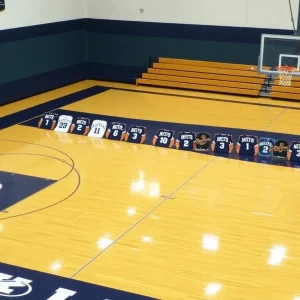Columbia: A Day of Justice and Remembrance
In the heart of Columbia, a significant chapter of history was revisited as seven brave men, who played a pivotal role in the Civil Rights Movement, had their criminal records cleared after more than 60 years. This momentous event took place in a courtroom at the Richland County Courthouse, where the impact of their actions came flooding back, illustrating the intersection of courage, perseverance, and justice.
A Leap of Courage in 1960
The story dates back to March of 1960 when a group of students, spurred by a strong desire for equality, staged peaceful protests against segregation in local businesses. Led by Simon Bouie and Talmadge Neal, the effort included a memorable sit-in at Eckerd’s Drug Store where both would soon find themselves arrested. Bouie, recalling that moment, remarked, “I wonder how many of us you’re going to arrest tomorrow,” as he was apprehended. This simple question signaled the beginning of something larger—an outcry for equality across America.
The Sit-Ins Spark a Movement
The protest didn’t stop with Bouie and Neal; the following day, more students, including Charles Barr, were arrested at Taylor Street Pharmacy for attempting to eat at a whites-only lunch counter. “No one really realized what happened 60 years ago,” Barr reflected during a recent ceremony—an acknowledgment of the fear and pressure they faced while standing up for their rights.
The actions of these young men formed part of a broader network of sit-ins happening nationwide, challenging discriminatory practices that allowed segregation. Their bravery categorically demonstrated that they would not accept Jim Crow laws without protest.
A Long-Awaited Expression of Justice
Fast forward 64 years, and the significance of their courage was officially recognized. Judge Robert Hood officiated at the ceremony that granted expungements of their criminal records. Bobby Donaldson, Director of the Center for Civil Rights History and Research at the University of South Carolina, eloquently stated, “We gather today in this courtroom to mark not just a moment in legal history, but a profound act of justice and remembrance for our community.”
Chairs in the courtroom were adorned with pale roses, honoring those who had passed on. Among the attendees were dozens of descendants and supporters, ready to witness the clearing of these historical blemishes from their family legacies.
A Community Welcomes Change
The expungement ceremony resonated deeply with more than just the men being honored. State Senator Darrell Jackson expressed sheer delight, indicating he would present a resolution in the Senate to commemorate their bravery. “I know the young men who sat at that lunch counter could never imagine a day when a Black solicitor could expunge their records and a Black state senator would introduce a resolution honoring them,” he remarked enthusiastically.
Reflections on a Legacy
Both Simon Bouie and Charles Barr, now 85 but still passionate about their legacy, shared thoughts about how unexpected their impact would be. They reflected on the leaders who guided them, including Rev. I. DeQuincey Newman and I.S. Leevy Johnson, who were instrumental in their fight for civil rights.
As the ceremony concluded, Donaldson summed it up beautifully, stating, “This is not just a moment of nostalgia; it’s a moment of deep, deep reflection.” Those men who sat down at a lunch counter literally carved their names into the pages of history, championing a cause that reverberated across the nation.
A Moment of Unity and Hope
Ultimately, the clearing of these records serves as a reminder to all of Columbia about the incredible sacrifices made in the pursuit of equality. As each name was formally recognized, there was a collective sense of pride in the room. The sit-ins of 1960 became more than just a series of protests; they ignited a fire for change that remains relevant today.
As Columbia stands witness to this pivotal moment in its history, it is a celebration not just of past struggles but of a community’s relentless pursuit of justice—both then and now.









